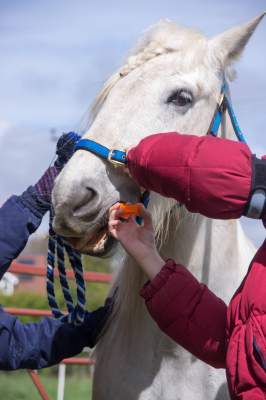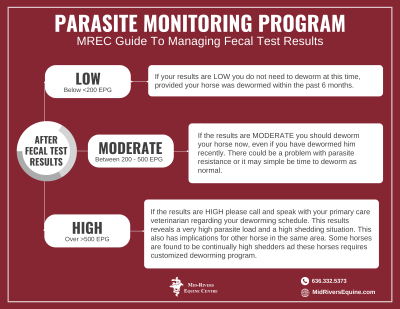
Take advantage of wormers’ different medications by using an alternating schedule.
EQUINE DEWORMING SCHEDULE
We recommend your horses be dewormed a minimum of twice per year (every 6 months). This can be done any time of the year but our best recommendation is to deworm consistently on May 1st and November 1st. In addition, on the November 1st deworming, use a product containing Praziquantel which will kill tapeworms as well. Products containing Praziquantel are Quest Plus, Zimectrin Gold or Equimax.
Twice a year deworming will control the parasite load in most horses. There are horses that are for some unknown reason, resistant to deworming medications and will continually shed high numbers of parasite eggs. These horses will only be discovered to be high shedders through a diligent fecal egg surveillance program.
Once discovered, we can take steps to manage these horses and protect those horses that are kept in the same area.
DEWORMING MEDICATIONS
Moxidectin, the active ingredient in Quest is our very best and most effective dewormer. It also has the smallest margin for safety so with any Quest product, it is very important to be aware of the horses’ weight. A weight tape can be very useful if you have not had the opportunity to actually weigh your horses. Do not use Quest products if your horse is sick, debilitated or underweight. In general we don’t recommend the use of Quest products on foals less than 18 months of age or older horses if they are thin. If you have any concerns regarding the use of Quest products, please contact your veterinarian or bring up the discussion at the time of your next well care evaluation. We have an electronic weight scale in the clinic, if you have an office visit, feel free ask us to weigh your horse(s).
Ivermectin is an older deworming agent and is still very effective. We use Ivermectin products on most horses with the exception of neonates that have not been dewormed on a monthly basis during their first six months of life. Ivermectin has a very large margin for safety as compared to Quest products.
All other dewormers have value, but are older and there is significant resistance in the parasite population.
IMPORTANT: Remember, a standard tube of dewormer is formulated for a horse that weighs 1150-1250 lbs. This can vary depending on the product. If your horse weighs more than 1250 pounds, please make sure the brand you are using covers the weight of your horse.
DEWORMING FOALS AND SENIOR HORSES
Foals less than one year of age and thin senior horses have specific issues that need to be addressed when planning your yearly deworming program. We strongly suggest that you discuss these matters with your veterinarian. The products that are on the market today are generally quite safe; however some patients require additional caution
FECAL TEST RESULTS – PARASITE MONITORING PROGRAM
Fecal egg count tests provide crucial information about the level of parasitic infestation in horses. By measuring the number of eggs per gram (EPG) in a given sample, the test is able to determine the effectiveness of deworming procedures. However, timing is key. The test should be conducted 14 days after deworming for accurate results.
The results of the fecal egg count test categorize the level of parasite load in horses as either low, moderate, or high. This information is highly valuable for proper parasite management. Depending on the results, the next course of action can be determined.
FECAL EGG COUNT RESULTS INTERPRETATION
LOW: If the results are Low (<200 eggs/gram) you do not need to deworm at this time, provided your horse was dewormed within the past 6 months.
MODERATE: If the results are Moderate (200-500 eggs/gram) you should deworm your horse now, even if you have dewormed him recently. There could be a problem with parasite resistance or it may simply be time to deworm as normal.
HIGH: If the results are High (>500eggs/gram) please call and speak with your primary care veterinarian regarding your deworming schedule. This result reveals a very high parasite load and a high shedding situation. This also has implications for other horses in the same area. Some horses are found to be continually high shedders and these horses require a customized deworming program.
Download the Parasite Management Program poster to hang in your barn. POSTER
